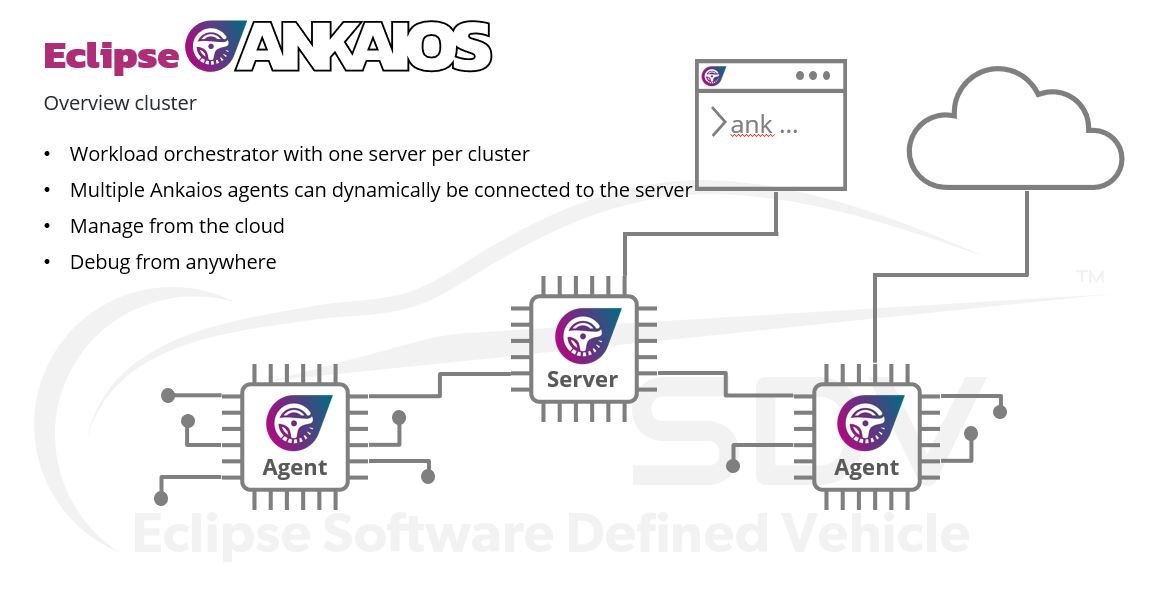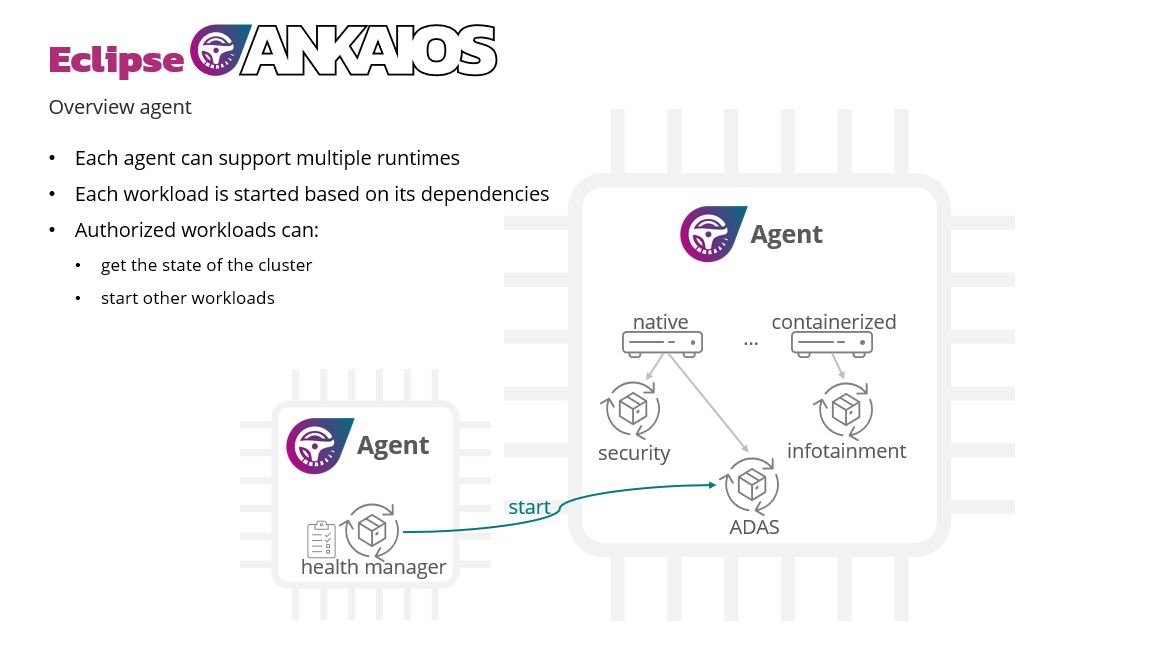
Managing automotive HPC software complexity with Eclipse Ankaios
The complexity of automotive high-performance compute (HPC) software has increased. This clearly presents challenges in managing and updating software workloads. Traditional container orchestrators used in cloud-native environments have proven to be inadequate for automotive HPCs.
Recognizing this gap, Elektrobit has introduced Eclipse Ankaios, an industry-first, open-source embedded container and workload orchestrator designed specifically to address the unique requirements of automotive original equipment manufacturers (OEMs). In this post, we explore the growing challenges in automotive HPC software management, the limitations of existing container orchestrators, and how Eclipse Ankaios provides a lightweight and powerful solution.
Growing challenges in managing and updating software workloads
Vehicles are more software-intensive than ever, and the trend is growing; managing and updating software workloads in automotive HPC systems poses significant challenges. OEMs need efficient solutions to handle the complexity and scale of software deployments in vehicles.
With various electronic control units (ECUs) and numerous software components running on them, orchestrating software workloads becomes a critical aspect of automotive software development. Traditional approaches struggle to meet the evolving demands of this changing landscape.
Limitations of existing container orchestrators for automotive HPCs
To be sure, container orchestrators like Kubernetes have revolutionized software deployment in cloud-native environments. However, they become inadequate when applied to automotive HPCs. Automotive systems have unique requirements, including real-time constraints, limited resources, and stringent safety and security considerations.
Traditional container orchestrators introduce unnecessary overhead and complexity, straining the already constrained resources in automotive HPCs. A specialized solution is required to efficiently manage containerized applications in automotive environments. Thankfully, specialized solutions is what we do best at Elektrobit.

Eclipse Ankaios – lightweight and powerful solution
In March 2022, Elektrobit joined an industry-led collaboration spanning automotive and technology companies known as SOAFEE. We immediately began investigating whether Kubernetes and its lightweight distribution K3S could work well for automotive HPCs. Once we created a demonstrator and started measuring various performance values, we determined it was not an accurate fit.
That said, our work was not without benefit. During the process, several customers inquired about container orchestration solutions for automotive HPCs. We saw this as a great opportunity, and in October of 2022, we created our own automotive HPC container and workload orchestrator called Ankaios.
Ankaios was developed as an open-source project, yet we used the same principles for automotive software development such as requirement tracing and having a solid design. Although requirement tracing is not common at all for open-source projects, the team implemented it for Ankaios in order to support the required ASPICE process for in-vehicle software.
Additionally, open-source tools such as PlantUml and Draw.io were used for architecture, and OpenFastTrace acted as the basis for requirement tracing so every contributor could have access to the tools as well. And although C/C++ is currently the dominant language for automotive software, we chose Rust due to its better memory safety and use of Cargo as a package manager, providing access to a large ecosystem of components.
This first-of-its-kind embedded container and workload orchestrator offers a purpose-built solution for managing software workloads in automotive HPCs; incorporating cloud-native concepts into in-vehicle use cases, providing a lightweight and powerful orchestration framework.
We developed Ankaios to also support various container runtimes, including Podman, offering a unified API to manage multiple nodes and virtual machines (VMs). This unified interface simplifies the management of containers and their applications within a single environment, both reducing complexity and improving efficiency.

Streamlining development with EB corbos Linux integration
Ankaios seamlessly integrates with Elektrobit’s open-source, EB corbos Linux – built on Ubuntu, an open-source operating system for automotive high-performance computing.
By leveraging Ankaios and EB corbos Linux – built on Ubuntu, developers can package applications in containers and test them in the cloud before deploying them on real automotive hardware. This streamlined approach accelerates software development, ensures robustness, and enables faster time-to-market for next-generation software-defined vehicles.
Embracing open-source standards and collaboration
Elektrobit actively supports open standards and collaboration within the Eclipse Software Defined Vehicle (SDV) Working Group. By contributing Ankaios as an official Eclipse SDV project, we aim to foster collaboration and innovation in the software-defined vehicle domain
Ankaios has already gained traction within the Eclipse SDV community, and its availability for public review encourages further enhancements and contributions from the open-source community. This collaborative approach ensures Ankaios evolves with industry needs and becomes a robust and widely adopted solution for automotive HPC software management.
Elektrobit’s Active Role in Eclipse SDV Community
Elektrobit is committed to the Eclipse SDV community, actively shaping the future of automotive technology. At events like the Eclipse SDV Hackathon Challenge, Elektrobit collaborates with enthusiasts to address real-world challenges. The “Maestro Challenge” is a standout initiative, powered by Ankaios, maintained by Elektrobit within Eclipse SDV.
Elektrobit also actively participates in Eclipse SDV’s community days, fostering connections and knowledge exchange. During the recent gathering in Ludwigsburg, the Ankaios team engaged with the community, presenting updates and a captivating demo. Anticipation for Ankaios is high, with inquiries flooding in ahead of the public source code release in late September.
Elektrobit’s involvement extends beyond presentations, actively contributing to breakout sessions. From integrating Ankaios into SDV Blueprint sessions to sharing insights during the SDV Process and Maturity Levels session, showing a commitment to collaboration, innovation, and the advancement of automotive technology on an open-source platform.
Open to innovation
By addressing the limitations of existing container orchestrators and incorporating cloud-native concepts into in-vehicle use cases, Ankaios simplifies software management, improves efficiency, and enables faster development and deployment of software-defined vehicles.
With its integration with EB corbos Linux – built on Ubuntu, and its commitment to open standards and collaboration, Ankaios is poised to become a leading solution in the automotive industry, empowering OEMs to navigate the complexities of automotive HPC software.
Ankaios on GitHub: https://github.com/eclipse-ankaios/ankaios



